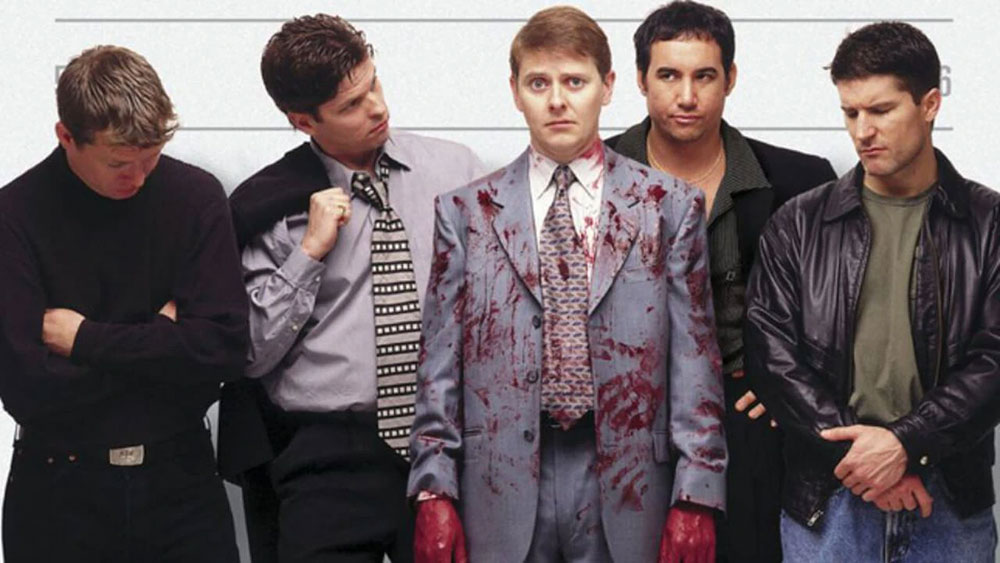Tonight New Yorkers get the rare chance to catch the 1997 comedy The Wrong Guy on the big screen at Museum of the Moving Image, co-presented with Hollywood Entertainment. A delightfully absurd man-on-the-run spoof that, due to corporate foolishness, was dumped direct-to-video in the States, the film remains the funniest comedy of its era that’s exceedingly difficult to view.
I spoke with the film’s authors, the triple threat of Simpsons and Malcolm In The Middle writer Jay Kogen, actor and writer David Anthony Higgins, and Canadian mensch Dave Foley, who overcame technical issues to join the conversation partway through.
All three will be on hand for a post-film Q&A moderated by Janeane Garofalo tonight. Screen Slate members get discounted tickets.
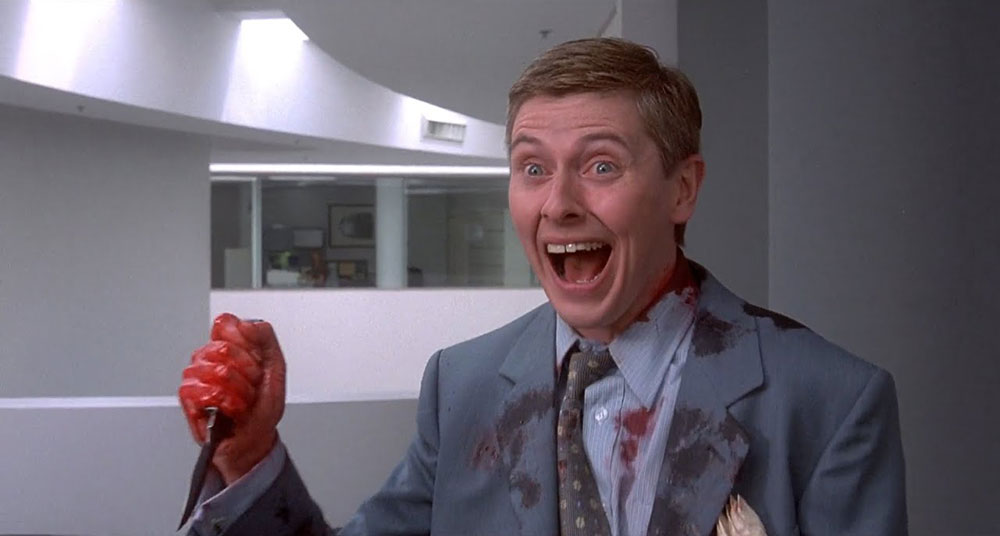
How did this script come about? Was this an idea that had been intended for a sketch?
Kogen: You have to talk to the guy who's not here yet. I think it was just the idea of someone on the run who was never a suspect. That was Foley's whole contribution.
Higgins: That was the only thing. And then after that, Jay and I just—we crafted it.
Kogen: We crafted it! Higgins and I took the idea and actually made it something. Foley sat in the corner drinking water. I was mostly behind the keyboard a lot of the time.
Higgins: Oh, 100% of the time. I mean, you were a much better typist than I have ever—
Kogen: A terrible speller though.
This movie was probably inspired by North by Northwest…
Kogen: We stole from Saboteur, we stole from North By Northwest. We stole from a ton of movies.
You say stole but, did you just lift scenes and figure out how to make the silliest version?
Kogen: The idea was the genre as opposed to direct parody.
Higgins: We weren't going to do a Mel Brooks or Airplane! type of parody where it's direct, word for word. We wanted to spoof the genre.
Kogen: We all come from a school of comedy where you want to play it very close to the vest. You're not winking at the camera. You're not goofing around. You take your comedy seriously, you take the situation seriously, and let the audience decide what's supposed to be a joke.
Higgins: And we basically hired every great Canadian actor.
Speaking of, there he is! Hello Dave Foley. They were telling me how the script came together. But were you concurrently writing Brain Candy (1996)?
Foley: Yeah, I was going through the hell of writing Brain Candy with The Kids In The Hall, then the sheer joy of writing The Wrong Guy with Dave and Jay.
Higgins: Half of the writing session would be Dave complaining about what he'd just been in.
Foley: And still, we would get twice as many pages done. Actually more, like 10 times as many pages done.
We were also talking about how there's a lot of Hitchcock influence.
Foley: Almost all Hitchcock movies are my favorite. Except for The Trouble with Harry. Hitchcock: not great at comedy.
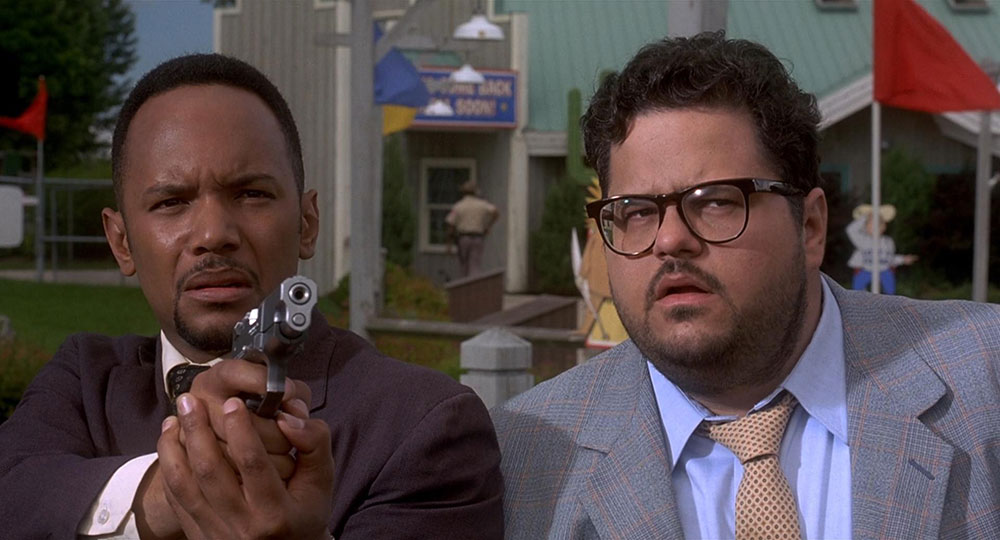
David had said that Jim Carrey saw the script at some point because you had the same manager, and he wanted to do it?
Higgins: Yeah, there was actually quite a bit of interest for Jim Carrey to do the film. I mean, we could have sold it with Jim Carrey as the star, but the whole reason behind us writing it was to do it for ourselves.
Kogen: Right. it would've been a much better Hollywood story though, had we taken Dave Foley's idea and then iced him out of the idea.
Higgins: I mean, it would have been better for all of us. It would have gotten released.
Kogen: That was part of the reason they didn't know how to market the film—there wasn't one big star. Hollywood's geared towards promoting films with, ‘It's another Jim Carrey movie.’ Or, ‘From the director of blank.’ We didn't have that.
Foley: The ad campaign, of uh, starring that guy on that TV show you don't watch.
Higgins: Yeah. You were still on News Radio.
A show that was critically acclaimed and publicly ignored, I think?
Foley: Yes!
Kogen: Well it ran for a bunch of seasons! That was the thing! We could have sold it and it could have been a much bigger movie with a much bigger budget, much harder for a movie studio to not release. But the whole reason to do this was to do it together. We're friends!
Higgins: I mean, if we sold it with Jim Carrey, we would have been able to write movies after that. We could have written a few movies that bombed and still made a nice living. But the idea was, [Canadian production company] Paragon Pictures was willing to do it with us in place and Dave as the star, so that was our point. We wanted to make our movie as opposed to someone else's.
Foley: And I to this day now advise all young comedians starting out: Do not follow your dreams.
Higgins: Sell your dream to Jim Carrey.
Foley: Yes. Or whoever the new Jim Carrey is.
Kogen: No, no, Jim Carrey now. The angry, retired Jim Carrey.
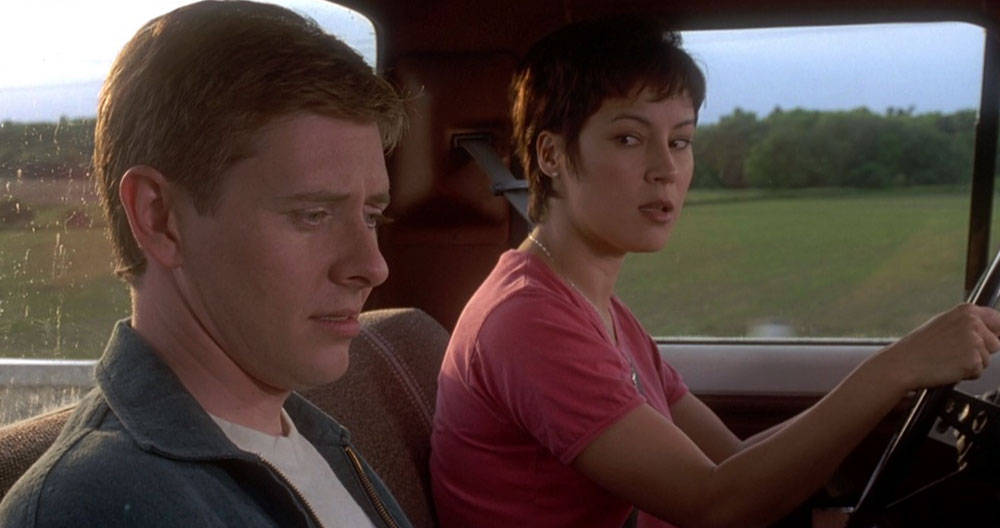
I’ve been trying to figure out how to phrase, ‘How does it feel to trust your instincts, have everybody you respect and like truly enjoy something…and still have it not work out?’
Higgins: That was the feeling from the absolute beginning. We sold the script really quickly. Shooting it was lovely. We had a great time. We get back, we screen it; people are saying, ‘This is the best, this is, oh my God, the best comedy.’ If you have three laughs, that's a good comedy; this gets laughs constantly. And then our US distributor basically closed down while we were editing. So we suddenly were an orphan film. The people at Disney [subsidiary Hollywood Pictures], Michael Eisner at the time, just didn't get it.
Kogen: They didn't want to spend $20 million dollars promoting a movie they weren't sure about. so they just said it's cheaper to sell off the rights and try to make their investment back by selling it to a DVD company or whatever. So they did.
During the editing process, you found out that Hollywood Pictures had shut down.
Foley: Actually, during the shooting! We were in the middle of shooting. It was a weird situation where they had cut together and taken a trailer to Cannes [market], and we were actually theoretically in profit on foreign sales before we finished shooting. But it was all contingent on an American release. So when Hollywood Pictures folded in the middle of production, we lost everything.
Kogen: Paragon Pictures was run by a guy named Jon Slan, who spearheaded the production side of our movie. He has told me I don't mention him enough in interviews. So I'm going to mention him now.
Foley: He was great. He's actually joining us in New York for the showing at the Museum of the Moving Image. He was a real advocate for this.
This movie is the highest compliment I can give a comedy, perfectly stupid, because it is so hard to make something where it bypasses intellect and goes straight into the amygdala.
Kogen: I argue that it's not stupid. It's a really smart comedy. There are a lot of jokes in there that the audience has to be smart too. They have to have a reference base. I don't think it's as stupid as as other comedies that are around.
Higgins: No, but you have to admit Dave's character is an idiot.
Foley: Yes.
Kogen: Yeah.
Foley: We were doing our version of The Jerk. Or any of those great Steve Martin movies. Take the Money and Run, that kinda movie.
Kogen: Right. But those are made by brilliant people.
Foley: Yeah. Like us!
This movie is an amazing example of people who actually succeeded in a way most of us could only dream of, that you made something wonderful with people you wanted to work with, that worked. But it was at the mercy of the ego of an incoming executive.
Higgins: We made the film we wanted to make. They can't take that away from us. It exists. They took away from us the idea that we could make more films.
Kogen: It's one of the great successes of our careers, regardless of whether it's revived or not. We made it, we love it. We were thrilled with the opportunity. It stands amongst us and our families as this thing we're super, super proud of. We're happy now that it's getting some sort of revival, that's thrilling, too. But had that not happened, we'd still be incredibly proud of it.
Higgins: It's also our reference, our Jack Benny reference of The Horn Blows At Midnight. Known failure. My nephew, who's a nepo baby, John Higgins, is in a group called Please Don't Destroy. They just made a movie, and I said, listen, John, enjoy the process. Have fun, because what happens is you have a great time to get to make the film, and then it disappears. I know this from experience.
Foley: Especially now. If our movie had been released, we had a shot. But now with the streaming world, unless it's a big blockbuster movie, it just disappears. Even filmmakers like David Cronenberg put out movies nobody's aware of.
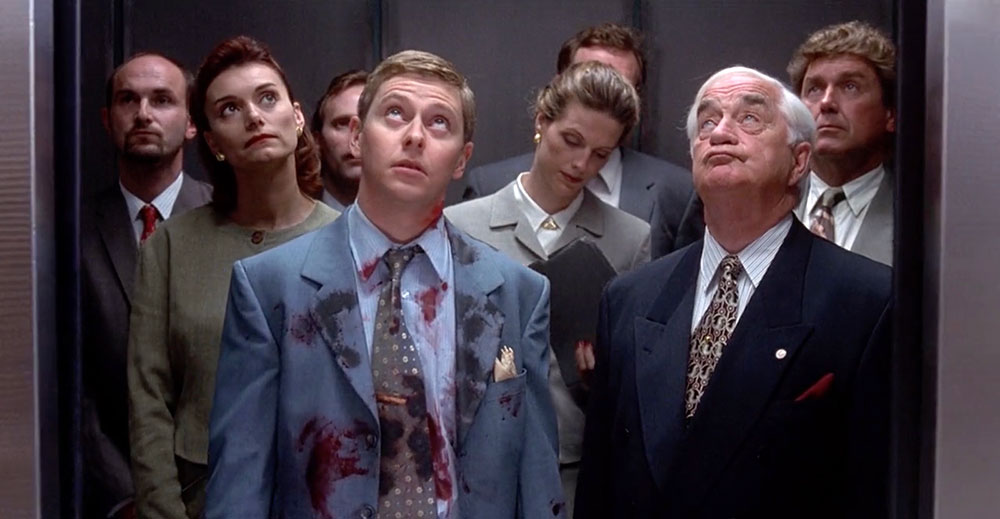
Director David Steinberg said this movie was such fun to work on and direct, and it's usually the case if you have fun on set, the movie isn’t great, but this was the rare exception.
Higgins: A lot of our choices were, they've got to be Canadian. I just want to quickly share. I had to call Jay up when we found out the Mail and Globe announced us as the greatest comedy of all time.
Canadian comedy.
JK: ...Oh. [laughs]
Higgins: We did have to cut quite a bit from our original screenplay for money, budgetary reasons. The train was fantastic. They had the train for eight days. It could only go on this little path, it wasn't very far, and they had to take it back and let it go through again.
Kogen: I was truly afraid for Dave. There was a time when the train is whizzing past him and he was getting sucked in by the wind of the train, into the train.
Higgins: You see Dave Foley in that moment. He is Nelson Hibbert throughout the film except when he's standing there waiting to jump. There is abject fear and Dave Foley.
Kogen: I believe off camera I was holding on to his feet. I didn’t want Dave to hurt himself. And Dave was very willing to hurt himself for the sake of this movie.
Foley: Yes. Well actually, I was still getting over torn ligaments in my ankle when we did that. Chasing and jumping through the train. I think I still was wearing an ankle brace.
What happened?
Kogen: He hurt himself tipping over the dumpster. Dave actually hit his ankle on the way down. Held production for two weeks.
Foley: Oh, it wasn't that long.
Is there a path forward for this film getting a wider release besides physically showing up with a print?
Foley: I don't know!
Kogen: Unless we can figure out who owns it.
Foley: We can we can do what Orson Welles did with Citizen Kane and do a tent show tour with it.
Kogen: What happened with the rights of this film, with [all our distributors folding at once], there was no one to own all these rights. Distribution rights, I believe, ended. So who owns it?
These are two concerns people in a younger generation are dealing with: somebody randomly owning something they made who contributed nothing to it and having to get around that, and making something people might not see.
Higgins: It's hard to fight any of this stuff, for individuals. But here's the great thing. If we could screen this film around the world—first of all, we love hanging out with each other. And two, we love talking about it; this film is our favorite subject. It's like when you're on a first date, ask them about themselves. If you just ask us about The Wrong Guy, we can talk for hours.
